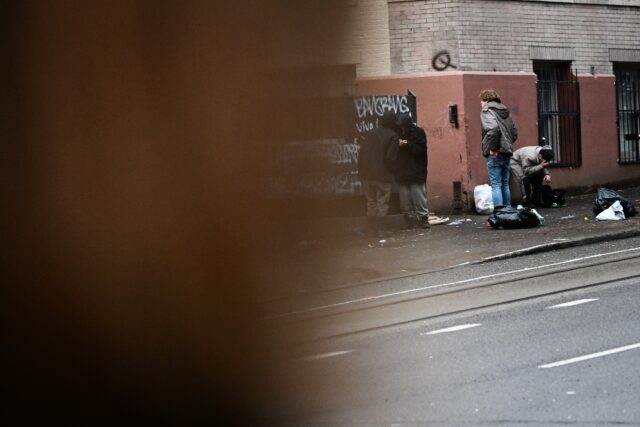It’s 9 am on a weekday, and real estate employee Erica Hetfeld has just watched paramedics try to save the life of a man who has overdosed on the streets of Portland.
“This is a tragedy,” she says as three disheveled men smoke fentanyl near her office in a city that was once a byword for laid-back livability.
Portland is a Democratic Party stronghold, a liberal sentinel in Oregon on the US West Coast that for years stood for social justice, empathy and tolerance.
But an experiment in decriminalizing drugs and a hands-off approach to policing has left some bemoaning the fate of a place now scarred by homelessness, addiction, graffiti and litter.
“You have no consequences for your public drug use… no consequences for breaking windows and trying to burn down public buildings,” said Hetfeld.
“That ‘no consequences’ attitude has completely changed the face of our city in fewer than four years. It’s been a spectacular nosedive.”
– ‘Shambles’ –
For decades Portland has been held up by its supporters as a proudly “weird” place, with a strong emphasis on sustainability and equality.
Knitwear-clad hipsters delighted in its small-scale breweries, plentiful coffee shops, vegan food stores and thriving indie music scene.
It became such a shorthand for bohemian trendiness that a TV series called “Portlandia” gently mocked it as a place “where young people come to retire.”
But the last few years have not been kind.
Portland’s commitment to social justice was tested during the Black Lives Matter protests as the city was rocked by weeks of destruction, with authorities standing back as demonstrators wreaked havoc. (Supporters say right-wing agitators stirred up violence.)
That was coupled with the economic devastation of the pandemic and the effects of an ill-executed plan to decriminalize drugs that has left police doing little more than handing out leaflets to people zombied out on crack or fentanyl.
Retail giants like Nike and Target have shuttered stores citing repeated thefts, while teleworking has hollowed out the downtown.
Conservatives have seized on the city’s misfortunes, with outlets like Fox News featuring horrorscapes from the city and blaming the Democrats who have controlled it for decades.
Former president Donald Trump dubbed it a liberal dystopia where the rule of law has vanished.
“The city is in shambles to this day. The store owners don’t even rebuild storefronts anymore,” he told NBC last year.
Restaurateur Lisa Schroeder says Portland’s decline pains her.
“We got to take care of the city,” she told AFP. “We’ve got drugs on every corner. So now there’s even more reasons for people to not come downtown.”
Schroeder runs Mother’s, a bistro that for 25 years has watched Portland grow from a city known for its left-wing politics into an attractive, well-planned urban area with efficient public transport.
In recent years money was moved away from the police and into social services, aiming to treat drug users instead of punishing them.
But she says the experiment with decriminalizing drugs — which she voted for — has been deliberately undermined by a police force she thinks is determined to prove it is bad policy.
“The police took a passive-aggressive approach. They said: ‘They took away our funding, we’re going to show them what’s up. We’re going to show them what decriminalization looks like’.”
Crime rates in Portland surged between 2019 and 2022, according to official data, before beginning to decline in 2023.
Still, the police take an average of 20 minutes to respond to a high-priority call.
– Make Portland Weird Again –
A campaign by a bipartisan citizen group aims to tamp down what it sees as some of the excesses of liberal governance while keeping hold of what makes Portland unique.
In the streets where signs demand “Keep Portland Weird” the group has put up billboards highlighting the failures of the city’s district attorney.
“Record drug deaths. Increased shootings. Rampant car thefts,” they say.
The campaign’s two founders — one Democrat and one Republican — say they are aiming for a little moderation.
“We were like a progressive Pantheon, we were like the leading light,” says Democrat Kevin Looper. “Now all of a sudden we’re a cautionary tale.”
In an increasingly polarized America facing its most divisive election in living memory, there must be a middle way, he says.
“Between the far left that thinks all cops are bad, and the far right that thinks we just need a police state, it turns out that most people are just left throwing their hands up in the middle saying: I would just like somebody to answer when I call 911.”

COMMENTS
Please let us know if you're having issues with commenting.